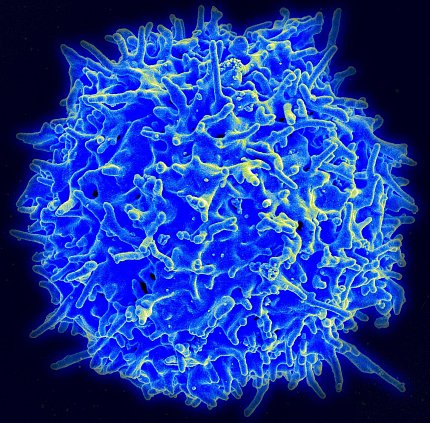Immune System May Mount an Attack in Parkinson’s Disease

Photo: NIAID
A new study suggests that T cells, which help the body’s immune system recognize friend from foe, may play an important role in Parkinson’s disease (PD). The study, published in the journal Nature, was supported by NINDS.
PD is a neurodegenerative disorder in which dopamine-producing brain cells die off, resulting in tremors, muscle stiffness, loss of balance and slow movement. Additional symptoms may include emotional changes and disrupted sleep.
“This collaboration between neuroscientists and immunologists provides important new evidence for ways in which the immune system can play a role in PD, a link that can be used to further define this interaction,” said Dr. Beth-Anne Sieber, a program director at NINDS.
A research team examined the role of T cells in PD. Members collected blood samples from 67 individuals with Parkinson’s disease and 36 healthy controls. Immune cells were extracted from the samples and mixed with portions of the alpha-synuclein protein, which accumulates in the brains of people with PD and can result in cell death.
They found that T cells from people with PD responded to the presence of alpha-synuclein to a much greater degree than those gathered from the control group.
In particular, two regions of alpha-synuclein evoked reactions from T cells: a section that often contains mutations linked with PD and a portion undergoing a chemical change that can lead to accumulation of the protein in the brain.
The researchers identified four genetic variations that were associated with T cell reactivity to alpha-synuclein. More than half of people with PD carried at least one of those variants, compared to 20 percent of controls.
“These findings expose a potential biomarker for PD that may someday help in diagnosing the disease or be used to evaluate how well treatments are working,” said one of the researchers.
According to the authors, the results suggest that PD may have characteristics of an autoimmune disease, in which the immune system incorrectly attacks the body’s own cells.
